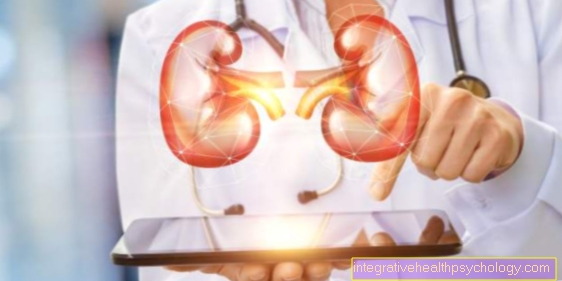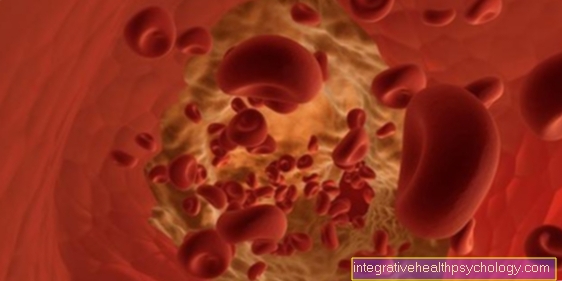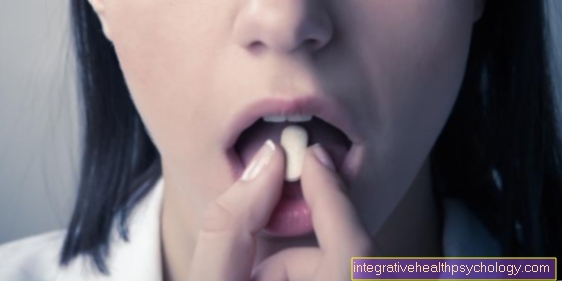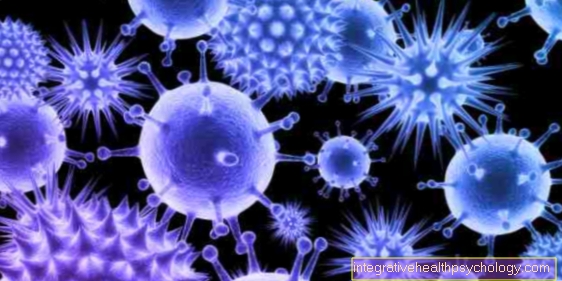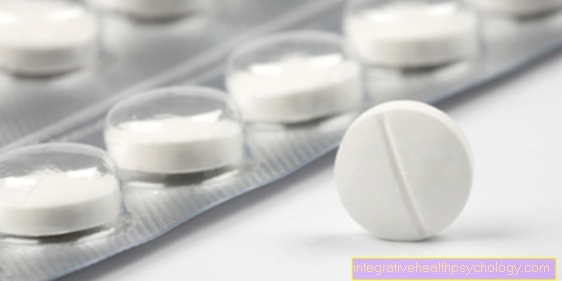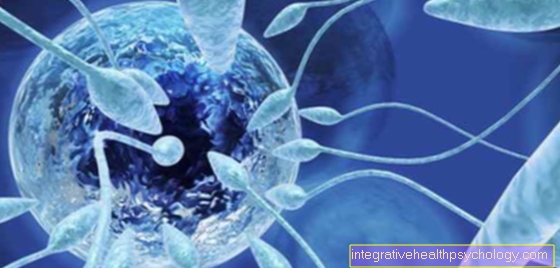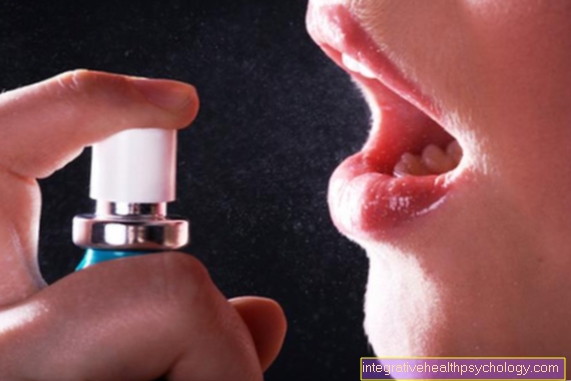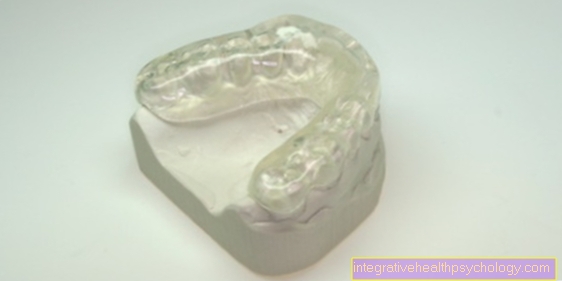Dark urine
definition
Urine is a fluid that is produced in the kidneys through filtration. Various products are excreted in the urine that the body no longer needs. The main constituent of urine is water.
So-called urochromes are dyes that give urine its color (see also: Urine color - what's behind it?). These arise from bilirubin, a breakdown product of the blood pigment hemoglobin. The urine is usually clear and yellow in color. From pale yellow to amber, anything can be possible.
The color of the urine often depends on the fluid intake. The urine is often darker in the morning because it is more concentrated overnight. A dark colored urine can also have other causes and can indicate certain illnesses or medication.
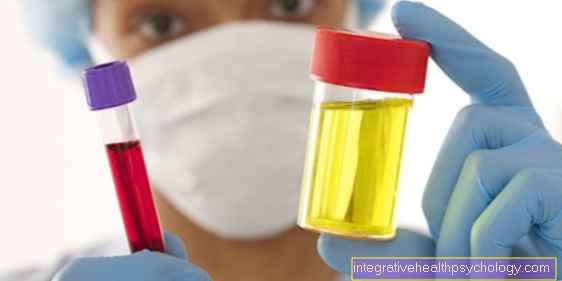
causes
There are a number of things that can cause your urine to darken. One explanation can be the increased or decreased fluid intake. At a Dehydration, i.e. decreased fluid intake, the dyes in the urine are more concentrated. This results in darker urine. This can be the case in the morning, after exercise, with diarrhea or in the heat. With increased fluid intake, the colorants in the urine are less concentrated and the urine is lighter.
However, diseases can also be responsible for the dark discoloration of the urine. A build-up of bilirubin caused by the increased breakdown of the blood pigment hemoglobin can cause the urine to turn dark. Elevated bilirubin in the urine can indicate liver or bile disorders.
With some diseases, the urine can even turn brown-black. Too high a concentration of melanin can be responsible. Melanin occurs naturally in the body and is responsible for the color of our skin and hair. If you let the urine stand for too long, it can turn black in the presence of melanin. However, melanoma can also cause discoloration of the urine. Porphyria can also cause urine to turn black. This is a rare enzyme disease in which the formation of the blood pigment is disturbed.
Some medications can also cause the urine to change color as a side effect. These include the antibiotic nitrofurantione and the Parkinson's drugs L-dopa and methyldopa.
In order to rule out serious illnesses and discoloration of the urine by blood, a urine diagnosis should be carried out by a doctor.
Dark urine through the liver / bile
Liver and bile disorders can cause the urine to turn darker. This is due to an increased concentration of direct bilirubin in the blood and consequently also in the urine. This will too Hyperbilirubinemia called. Bilirubin is a natural substance in the body and is produced by splitting the blood pigment hemoglobin. The bilirubin is then processed in the liver to be excreted via the biliary tract and kidneys. A disease of the liver or the bile, or the biliary tract, can lead to a disruption in processing or removal and the bilirubin accumulates. The increased bilirubin also causes the skin to turn yellow. This then becomes or also jaundice Jaundice called.
The following diseases can lead to a Jaundice and a dark color of the urine:
- hepatitis
- Cirrhosis of the liver
- Congested liver
- Meulengracht's disease
- Liver tumors
- Pancreatitis
- Gallstones.
Dark urine from medication
The side effect of some drugs is discoloration of the urine. Ingesting high doses of vitamin B2 can cause the urine to turn dark yellow. The antibiotic nitrofurantoin can turn the urine brown-yellow. This is a common antibiotic for urinary tract inflammation. Rifampicin stains the urine red. It is an antibiotic that is mainly used to treat tuberculosis. The drugs L-dopa and methyldopa can even turn the urine brown-black. These are typical Parkinson's medications. L-Dopa is a precursor to melanin, which at high concentrations can also cause the urine to turn black.
Dark urine in the morning
If the urine is a little darker than normal in the morning, this is usually nothing to worry about. Because less fluid is usually absorbed overnight than during the day. This creates a slight lack of fluids and the urine is more concentrated. This means that there is a higher percentage of dissolved substances in the urine. These substances also include dyes that give urine its yellow color. The dyes in the urine will be Urochrome or also called urine pigment. Urochrome are metabolic products of the body and are also produced by the breakdown of the blood pigment hemoglobin. Due to the increased fluid intake during the day, the urine is less concentrated and usually becomes lighter again.
Dark urine from coffee
Drinking coffee does not usually make the urine darker. Rather, the opposite could happen. Because the caffeine in coffee has a diuretic effect. This means that more urine is produced and excreted. The urine is less concentrated and therefore lighter. So if the urine is darker than normal, there will be another cause and not the consumption of coffee.
Dark urine at the end of pregnancy
Dark urine during pregnancy can have several causes. A simple reason can be lack of fluids. During pregnancy, the woman should drink at least 1.5-2 liters of fluid. However, pregnancy cholestasis can also be behind this. This is a liver disease in the mother during pregnancy. In addition to the discoloration of the urine, there is usually yellowing of the skin and itching. Since this disease can cause premature labor and premature delivery, this should be clarified by a gynecologist.
Read more about this at: Pregnancy cholestasis
Concomitant symptoms
Depending on the cause of the dark urine, further symptoms can occur. Since the most common cause of dark urine is dehydration, it can add headache, dizziness, and confusion. In the worst case, it can lead to impaired consciousness up to loss of consciousness or a Delirium (Passage syndrome) come.
Furthermore, an increased concentration of bilirubin can lead to discoloration of the urine. The increased bilirubin can build up in the skin and lead to a Jaundicecalled jaundice. It is often observed that patients experience itching with increased bilirubin. Another symptom is often pale stools.
If the cause is a dysfunction of the liver, further symptoms such as pressure in the upper abdomen, dropsy and fatigue may occur. A gallstone can also cause colicky, wave-like pain in the right upper abdomen.
If the reason is tumorous growth, accompanying symptoms such as weight loss, heavy night sweats and fever can be an indication of this.
Dark urine and light colored stools
If dark colored urine appears with pale stools, this could be an indication of a cholestatic, thus the bile concerned, be disease. It is a complex of symptoms: dark urine, light-colored stools and itching. The reason for this is an increased level of bilirubin in the blood. The bilirubin normally gets into the intestine via the bile. This gives the chair its color. If the bile outflow is disturbed, there is a lack of bilirubin in the intestine. It is increasingly excreted in the urine. This will cause brown urine and discoloration of the stool.
Dark urine and fluffy urine
Normally, the urine of a healthy person is clear and light. Some diseases can change the urine in its texture, color and smell. If the urine is cloudy this can have various causes.
When the urine is inflamed, it is often cloudy and light and may appear flaky. The reason is an increased concentration of proteins and bacteria in the urine. If the urine is rather red-brown and cloudy, red blood cells are mostly responsible. This should be examined and clarified immediately by a doctor.
More on this: Fluffy urine
Duration
The duration of the discoloration of the urine depends on the cause.
If a drug is responsible for the dark color of the urine, then the urine will normalize as soon as the drug is no longer taken.
If the discoloration is caused by a lack of fluids, the urine will become lighter again within a few hours of ingesting fluids.
If an increased concentration of bilirubin is the cause, then it depends on the triggering disease. Inflammation treated with antibiotics can last 10-14 days. Gradually, the dysfunction of the liver or bile gets better, and within this period the urine normalizes. However, there are also diseases of the liver and bile that cannot be cured. The dysfunction may persist and the urine will remain dark.
Treatment / therapy
In order to treat the dark urine, the cause of it must be eliminated. Treatment depends on the reason for the discoloration of the urine.
With a simple one Dehydration a sufficient fluid intake must be ensured. If there is a severe lack of fluids, it may be necessary to use a drip, i.e. a infusion to give.
Because many liver diseases cause bilirubin increases, there are specific treatments for each. In general, a healthy lifestyle should be aimed for. This includes abstaining from alcohol and eating a balanced diet. Liver diseases are often treated with special drugs. Antibiotics are used when there is inflammation.
If you have gallstones, you will try to remove the stone. This can be done endoscopically by means of a mirror or an OP. Most of the time, the gallbladder is completely removed at a later date, as gallstones often return and cause problems.
Dark urine in the baby
Dark urine in the baby can also indicate a lack of fluids. As a rule, babies do not need additional fluids in the first few months of life. Breast milk or pre-food is sufficient. If the baby refuses to drink or has diarrhea, he or she may become dehydrated. In addition, less full diapers and increased skin folds can then be noticed. Another reason could be newborn jaundice. Almost all babies have jaundice after birth and is usually not bad and goes away on its own within a few days. If the jaundice persists or gets worse, there may be fever, poor drinking and extreme tiredness. Dehydration can occur and the concentration of bilirubin in the urine is increased. In any case, this should be clarified and treated by a pediatrician.
diagnosis
The doctor can use urine diagnostics to determine the reason for the dark urine and, consequently, the diagnosis. To do this, first a urine test strip or also Urine stix used. This is a simple, quick and inexpensive test procedure. The test strip shows whether a certain metabolic product or another component is increased in the urine. This gives the doctor an indication of whether the urine is blood, proteins, bacteria or bilirubin. Then other targeted methods can be used to find out the cause of the dark urine and to make the diagnosis.
By taking a blood sample, other substances can be determined whose values can be assigned to specific organs. If these are outside the norm, this can indicate a disease of the organ.
You might also be interested in this topic: Urinalysis





